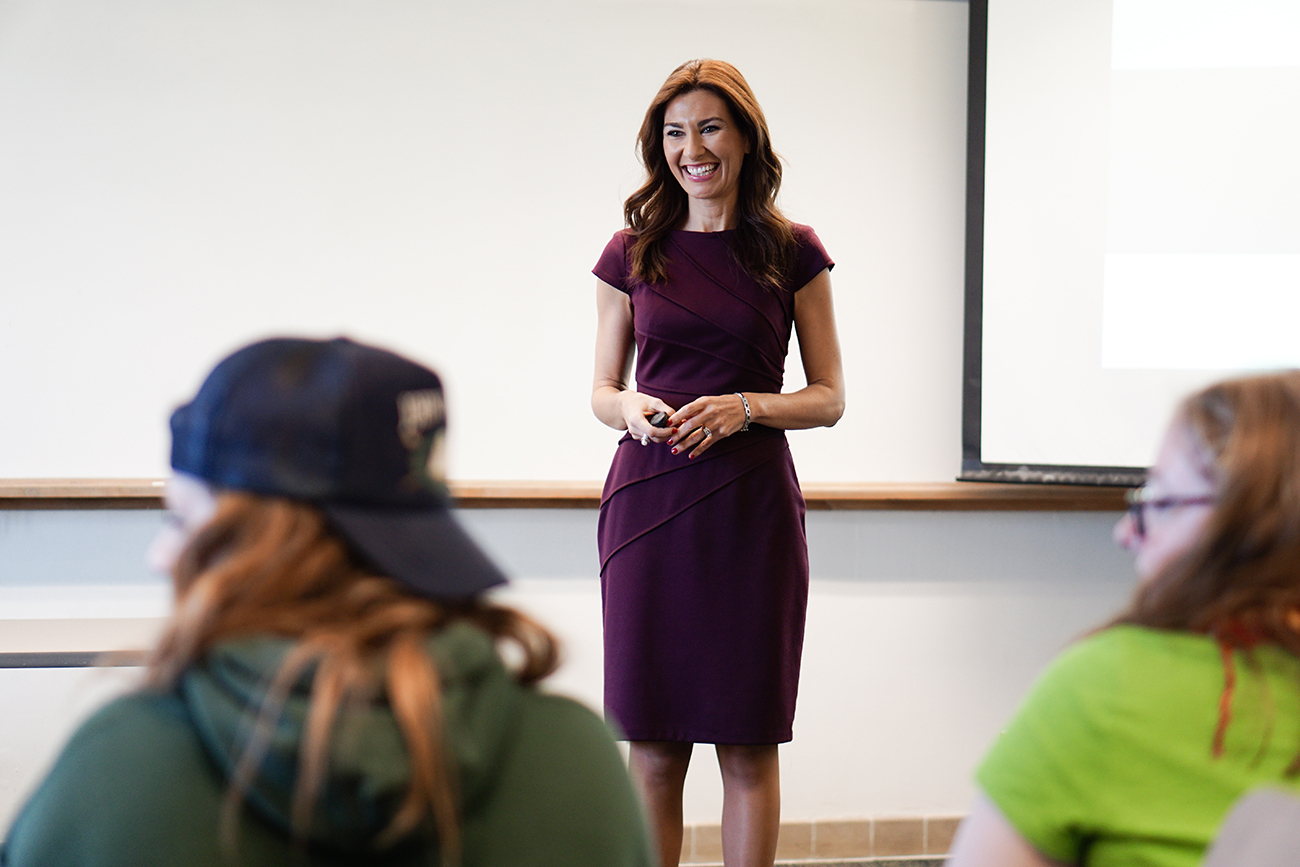
During a time when many students are learning online, Julia Domínguez, associate professor of Spanish, is being honored for her innovative teaching methods which have fueled student engagement, enhanced learning and sparked creativity in the classroom.
“I’m constantly asking myself, ‘How can I make the material more engaging and meaningful?’” Domínguez said. “Students arrive in my classroom with their own talents, personal goals and areas of expertise, and I treat each one as an individual.”
The result is a highly personalized brand of teaching, which Domínguez has polished and perfected during her 18 years in the Department of World Languages and Cultures. Her Spanish literature, culture, history and language courses are popular and fill up quickly.
Domínguez’s success with students, as well as notable accomplishments in research and publishing, have earned her the 2020 Cassling Innovation Award. This special recognition, established by Dr. Randal S. Cassling and Lori S. Cassling, rewards and supports outstanding faculty members who demonstrate innovation in teaching and research.
Domínguez has inspired thousands of students to connect their interests to class projects, assignments and discussions.
“Julia took the time to discover that I loved art and she encouraged me to follow that passion, so I developed a website featuring Spanish art and artists,” said Kathryn Burns (’23 Spanish and political science). “Her classes are always an exciting place to learn.”
Domínguez’s classrooms overflow with inventive ideas and activities. Projects are shared in class, igniting thoughtful dialogue and lively discussions.
Students have created podcasts, magazines, elaborate board games and more. After reading “Don Quixote,” a psychology student presented a detailed psychoanalytic profile, based on the main character’s dramatic behavior. A student with an interest in nutrition published a book of Spanish recipes that were inspired by dishes mentioned in the required reading. Several education majors have prepared curriculum plans for teaching Spanish to their future students.
“I try to get away from the traditional approaches to teaching because there’s so much more that we can do as educators,” Domínguez said. “I’m constantly asking my students, ‘How can you bring what you’ve learned into the real world?’ and ‘How can you share what you’ve learned with others?’”
Fostering international opportunities
Domínguez also inspires learning and growth beyond the classroom walls—as far away as Europe.
As the co-director for two Spanish study abroad programs, Domínguez oversees a 6-week summer experience in Valencia, Iowa State’s most popular study abroad program; and a semester-long program in her hometown of Cáceres.
Harnessing her knowledge of the region and her connections to local businesses, Domínguez has helped hundreds of students to secure internships in Cáceres.
“It’s incredible how we’ve created a colony of Iowa State students in my hometown,” she said. “Whenever I visit Cáceres, I have many people telling me about the wonderful things our students are doing there.”
Biology students have conducted research in Spanish hospitals and education majors have taught English in local schools. An engineering student learned how to design and construct wheelchair-friendly ramps for historical buildings that date back to the Middle Ages.
“My role as an educator is to open mental doors as well as physical doors for students, and it’s truly an honor to do so,” Domínguez said.
Although both study abroad programs are temporarily paused due to the pandemic, Domínguez looks forward to resuming these opportunities in the coming months.
A wealth of professional accomplishments
Domínguez is an award-winning scholar, author and accomplished researcher with more than 20 peer-reviewed publications. She is considered an expert in early modern Spanish literature, culture and history and an international authority on Miguel de Cervantes, the most celebrated Spanish author.
A skilled writer, Domínguez has published a collection of essays “Cervantes in Perspective.” She is also the co-editor of “Hispanic Studies in Honor of Robert L. Fiore” which includes more than 30 essays.
“I’m grateful for the Cassling Innovation Award, which allowed me to complete my latest book, ‘Quixotic Memories: Cervantes and Memory in Early Modern Spain,’” Domínguez said. “The Cassling’s generous support has advanced my research and helped me to better serve my students.”
For the 2021-2022 academic year, Domínguez was awarded the prestigious Biruté Ciplijauskaité Research Fellowship from the Institute for Research in the Humanities (IRH) at the University of Wisconsin-Madison. There she will work on her new book project “The Arts of Mnemosyne: Expressions of Mnemonic Culture in Renaissance Spain” which examines the influence of the art of memory on poetry in early modern Spain.
Domínguez was recently named Outstanding Teacher of the Year by the American Association of Teachers of Spanish and Portuguese. Her university honors include an ISU Award for Outstanding Achievement in Teaching, the Shakeshaft Master Teacher Award, an ISU International Service Award and many others.
“I couldn’t have succeeded without my students who have helped me become a better teacher and a better educator,” she said. “When I go into a classroom and see all of these beautiful faces looking at me, I never see this as work. I love teaching and I love my students.”